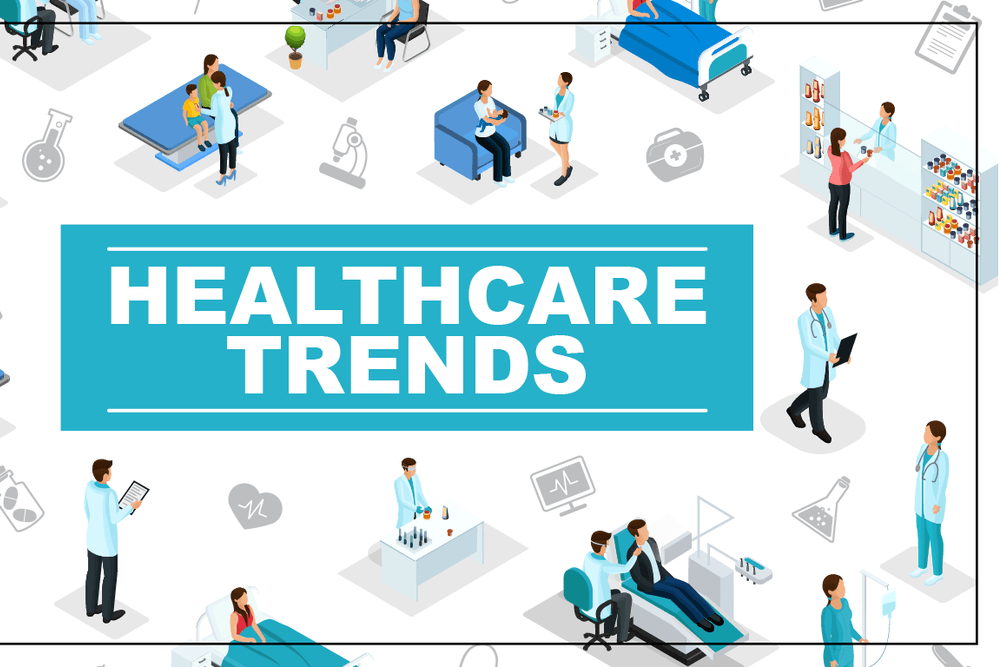Trends prevail in many categories within a same topic. When it comes to the topic of healthcare, categories such as governmental initiatives, health, and consumers (patients) all have trends and advancements with one thing in common: technology.
Trends That Will Likely Arise or Continue in 2019
Whether it be genomics or value-based care, technology has infiltrated itself into almost every aspect of the healthcare cycle. From patients reviewing their medical reports online or on an app to the actual state of the art technology used by medical professionals, and everything in between, technology has definitely made its mark.
Electronic Health Records (EHRs)
Understandably, EHRs have been around for a while, but it is the adoption of digital records and open communication to various healthcare professionals that has sparked a newer trend: patient-centric care.
With the help of valuable medical information that is available at your fingertips, healthcare professionals from various divisions and establishments can access a patient’s medical history quickly and securely. What ensues is better and more informed decisions around patient care, contributing to better patient outcomes.
As an increasing number of clinics and hospitals have implemented EHRs, this technology has the potential to improve long term patient care. It is now not only possible for EHRs to recognize effective treatment plans and patterns in patient care within the same establishments, but potentially across healthcare systems as well thanks to the push for data interoperability.
Blockchain Genomics
The hot new topic making headlines seems to be genomics and the blockchain. With the potential rise of a genomic big data market, personal genome sequencing could spark a billion-dollar market. In fact, according to Nebula Genomics’ Whitepaper, Blockchain-enabled genomic data sharing and analysis platform, this specific market size could reach $27.6 billion by 2025.
Stemming from the digital currency, Bitcoin, blockchain permits digital information to be circulated without being copied. Tapping into something EHRs cannot do, blockchain systems can transfer data across healthcare systems, much like what interoperability is trying to reach. As EHRs cannot connect and share data with other systems, the use of blockchain systems in the healthcare industry could lead to cross border communication and won’t limit information sharing between systems.
Artificial Intelligence
Artificial intelligence will always be a trend in any industry, especially healthcare. Will there be a specific revelation or breakthrough in 2019? Probably not, as artificial intelligence plays the long game.
Over the next few years, decades and so on, artificial intelligence will open unimaginable doors for medical professionals and contribute to better patient care not only locally, but globally.
Predictions on AI have touched treatments, surgeries, workflow productivity and more. In specialties such as radiology, artificial intelligence seeks to aid providers enhance treatments by eliminating the need to take tissue samples from patients.
According to a Forbes article, AI presents a huge opportunity for the healthcare industry, as the top applications are predicted to rake in $150 billion by 2026. Furthermore, investments by the public and private sectors are expected to reach $6.6 billion by 2021.
Value-Based Care
The model of paying providers for the quality of care they provide versus the number of patients they see has been labelled value-based care. Through continuously evolving technology, providers, payers and other stakeholders will be capable of measuring patient outcomes and better determine:
- Treatment plans
- Health outcome measures
- Payment systems
- Costs
This transition, however, will not be done overnight and will likely be slow and steady for the year 2019.
Drug Spending
Predictions for 2019 in terms of drug spending revolve grossly around hospitals trying to cut drug costs. Accounting for roughly $3.3 trillion in annual spending, the healthcare industry spends 18% of the U.S.’ gross domestic product on drug costs. Here is a breakdown:
- Hospital pharmacy costs: 10-20% of operating budget
- Drug costs: 80% of pharmacy costs
The trend, other than trying to diminish costs, will be to utilize data-driven technology that can track and associate drug spending to clinical outcomes. Departments such as pharmacy, IT and others will likely band together to automate processes and develop ways to manage prescription costs. This can be done, in part, through patient analytics and encouragement of generic brands over pricey name-brand drugs.
Population Health
To move towards patient-centered care and to drive better care outcomes, emphasis on patient engagement is at its highest. The trend seems to point towards voice-driven communications.
Known as the Voice User Interface (VUI), this technology is already present in a patient’s life through Amazon’s Alexa and Apple’s Siri, among others. With the goal to engage with patients outside of the office and provide a “human” experience, this technology is gaining ground in the healthcare industry.
As the patient wants to feel empowered throughout their experience, VUI offers the opportunity for them to schedule appointments, track their care plan and receive answers to important questions throughout the care process and ultimately promote better health practices. This new technology is likely to quickly integrate healthcare strategies in the near future.
These are simply some of the trends we have seen and will continue to see throughout the year. From patient care to hospital spending and everything in between, 2019 trends will likely be technology-focused as they continue to bring our healthcare industry to the next level.

